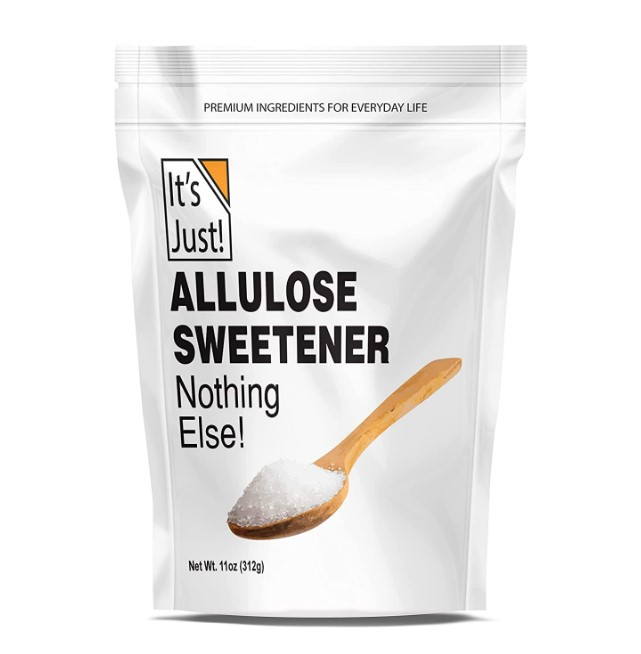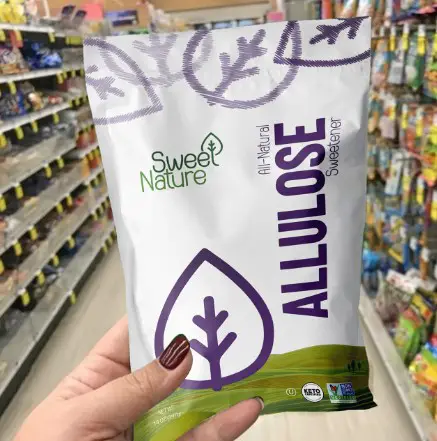Originally posted on July 28, 2022 @ 3:57 am

If you’re looking to cut down on your sugar intake, but don’t want to give up sweetened foods and drinks, Allulose may be a good alternative for you. This natural sugar occurs in small amounts in certain fruits and vegetables, but can also be made artificially. It has the same sweetness as regular sugar, but with fewer calories. Allulose is becoming more available in grocery stores, so here’s a guide to where you can find Allulose sweetener in grocery store.
Table of Contents
What Is Allulose Sweetener?
Allulose is a type of sugar that occurs naturally in some fruits and vegetables. Unlike other types of sugar, allulose is not metabolized by the body, so it does not contribute to blood sugar levels or cause tooth decay. Allulose is about 70% as sweet as sucrose (table sugar), making it a good option for people looking to reduce their sugar intake. Allulose is also less likely to cause gastrointestinal issues than other types of sugar alcohols.
What Is Allulose Sweetener Used for?
Allulose has a variety of uses, both in the kitchen and in commercial food production. Here are some of the most popular uses for allulose sweetener:
A. Baking
Allulose can be used as a replacement for sugar in many baking recipes. It has a similar taste and texture to sugar, making it a great way to cut calories without sacrificing taste.
B. Cooking
Allulose can be used to sweeten sauces, desserts, and other cooked dishes. It is heat-stable, so it will not break down or change flavor when heated.
C. Commercial food production
Many commercial food manufacturers use allulose as a sugar replacement in their products. This includes brands like Splenda, which uses allulose in its zero-calorie sweetener products.
Where To Find Allulose Sweetener In Grocery Store?

If you’re looking for allulose sweetener, there are a few specific aisles you should check out in your grocery store. Here are some tips on where to find Allulose sweetener in grocery store.
Check the baking aisle
Allulose is often used as a sugar substitute in baking recipes, so it’s likely to be shelved with other baking supplies.
Look for natural sweeteners
Allulose is sometimes categorized as a natural sweetener, so it may be located near other natural sugars and syrups.
What Grocery Store Sells Allulose Sweetener?
Here are a few good sites to find Allulose Sweetener in grocery store:
Online retailers
You can find allulose at many online retailers that sell natural and healthy food products. Some good places to start your search include Amazon, Thrive Market, and Vitacost.
Natural food stores
Most natural food stores carry allulose in the baking aisle. You can also ask a store employee if they can order it for you if they don’t have it in stock.
Specialty stores
Some stores that sell specialty cooking or baking ingredients may also sell allulose. Try searching for “allulose” on the website of your favorite store.
Manufacturers
Some manufacturers sell allulose directly to consumers through their websites. Try searching for “allulose” on the website of your favorite food or beverage company.
International retailers
Allulose is also available from international retailers. Try searching for “allulose” on websites like Alibaba and Global Sources.
Where To Buy The Allulose Sweetener Near Me?
Allulose sweetener is starting to become more widely available at grocery stores near you. If you’re looking for an allulose sweetener, there are a few places you can buy it. The best place to buy allulose is online, through a retailer like Amazon. You can also find allulose at some health food stores, but it’s often more expensive than buying it online.
Common Types Of The Allulose Sweetener
Here are some of the most common types of allulose sweetener:
1). Fruit-Based Allulose Sweeteners
These types of allulose sweeteners are made from fruits such as grapes, apples, and pears. They tend to be less sweet than other types of allulose, but they still provide a good amount of sweetness.
2). Vegetable-Based Allulose Sweeteners
These types of allulose sweeteners are made from vegetables such as carrots, potatoes, and beets. They tend to be less sweet than fruit-based allulose sweeteners, but they can still provide a good amount of sweetness.
3). Allulose Syrup
This is a type of allulose that is made by combining allulose with water. It is often used as a syrup for pancakes or waffles. Additionally, it can be used to sweeten tea or coffee. Allulose syrup is typically sweeter than other types of allulose, so it may not be the best choice for those who are looking for a less sweet alternative to sugar.
4). Powdered Allulose
This is a type of allulose that is made by grinding allulose into a powder. It can be used to sweeten coffee or tea, or it can be used as a baking ingredient. Powdered allulose is typically sweeter than other types of allulose, so it may not be the best choice for those who are looking for a less sweet alternative to sugar.
Substitute for The Allulose Sweetener

Here are some good substitutes for Allulose Sweetener if you don’t find Allulose Sweetener in grocery store:
1). Erythritol
This is a sugar alcohol that is about 70% as sweet as sugar. It has a very clean taste and doesn’t have any aftertaste. Erythritol is slowly absorbed by the body and doesn’t cause any spikes in blood sugar levels.
2). Xylitol
This is another sugar alcohol that is about as sweet as sugar. Xylitol has a slight cooling effect on the tongue and can cause stomach upset in some people.
3). Stevia
This is a plant-based sweetener that is up to 300 times sweeter than sugar. It has a very clean taste with no aftertaste.
4). Monk fruit extract
This is a plant-based sweetener that is about 150 times sweeter than sugar. It has a very clean taste with no aftertaste.
5). Tagatose
This is a natural sugar that is about as sweet as sugar. Tagatose has a slight cooling effect on the tongue and can cause stomach upset in some people.
6). Sorbitol
This is a sugar alcohol that is about 60% as sweet as sugar. It has a very clean taste and doesn’t have any aftertaste. Sorbitol is slowly absorbed by the body and doesn’t cause any spikes in blood sugar levels.
7). Maltitol
This is a sugar alcohol that is about half as sweet as sugar. It has a very clean taste and doesn’t have any aftertaste. Maltitol is slowly absorbed by the body and doesn’t cause any spikes in blood sugar levels.
How To Make Allulose Sweetener At Home?
If you do not find Allulose sweetener in grocery store, you can totally make it at home. It’s actually very simple! All you need is water and a food-grade Allulose powder. Here’s a step-by-step guide on how to make Allulose sweetener at home:
1. Combine 1 cup (240 ml) of water with 1 cup (100 grams) of Allulose powder in a small saucepan.
2. Place the saucepan over medium heat and stir until the Allulose has dissolved completely.
3. Remove the saucepan from the heat and allow it to cool. Once it’s cooled, transfer the Allulose syrup to a glass jar or container.
4. Store your Allulose syrup in the fridge for up to 2 months. To use, simply add it to beverages or recipes in place of sugar.
FAQS To Find Allulose Sweetener In Grocery Store
Refer to the commonly asked questions below to find Allulose Sweetener in grocery store.
1). How is Allulose different from other sugar substitutes?
Allulose is a type of monosaccharide or simple sugar. Unlike other sugars, it is not metabolized by the body, so it does not contribute to tooth decay or increased blood sugar levels. Allulose is also much lower in calories than other sugars.
2). Is Allulose safe to consume?
Yes, Allulose is a safe and natural sugar substitute. It has been used in food products for decades, and there are no known side effects associated with its consumption.
3). What are the benefits of Allulose?
Because Allulose is not metabolized by the body, it can help to reduce calorie intake and prevent weight gain. Additionally, Allulose does not contribute to tooth decay or increased blood sugar levels.
4). What are the drawbacks of Allulose?
Allulose is a relatively new sugar substitute, so there is limited research on its long-term effects. Additionally, Allulose is more expensive than other sugar substitutes.
5). Is Allulose better for you than sugar?
It depends on your goals. Allulose is lower in calories than sugar, so it can help you to lose weight or prevent weight gain. However, Allulose is more expensive than sugar, so it may not be the best choice if you are trying to save money. Additionally, there is limited research on Allulose, so its long-term effects are unknown.
Conclusion
Allulose can be a great sugar alternative for people with diabetes or those looking to cut down on their sugar intake. Additionally, it can be utilized in cooking and baking. You can find Allulose sweetener at most major grocery stores. If you’re not sure where to find Allulose sweetener in grocery store, just ask a store employee. Be sure to share this blog post with your friends and family who are also looking for healthier sugar alternatives.
See also:
Leave a Reply